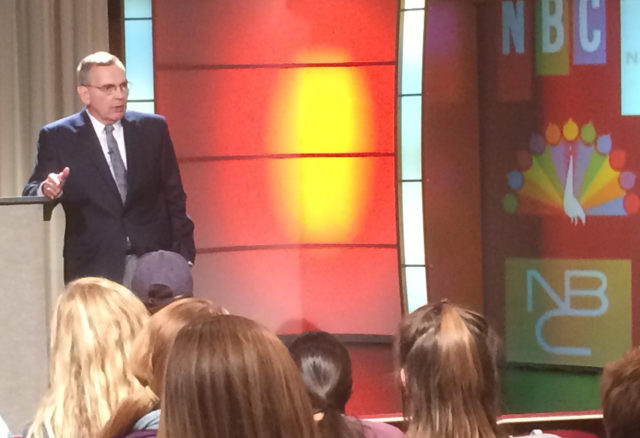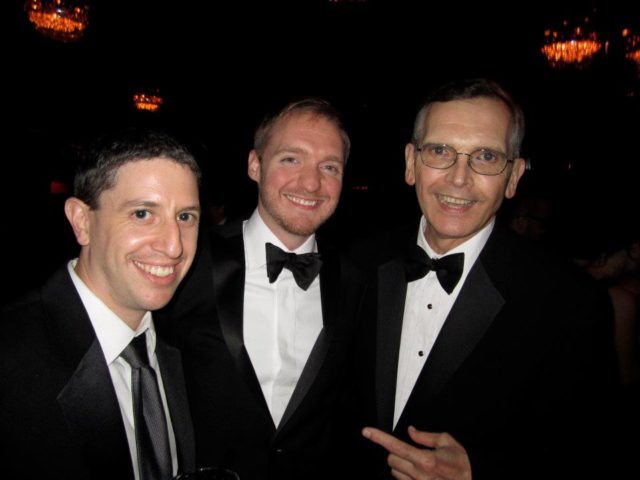Both of the proprietors of this website had the privilege of working with Rick Ludwin at NBC. Rick was a giant, both at the network where he worked for over 3 decades, and in the world of television comedy as a whole, especially late-night, where he supervised everything from “The Tonight Show With Johnny Carson” to “Saturday Night Live,” rising to be Executive Vice President, Late Night & Specials. His expertise and ability to find the place where cutting edge comedy could become a mainstream smash were perhaps most widely recognized when he became the champion of a little sitcom concept that would become “Seinfeld.” (Rick believed in “Seinfeld” so much that he bore the primetime development costs on his own late-night budget, a truly monumental leap in this industry.) We’ve asked Nick Bernstein, a friend of Rick’s who worked closely with him at NBC, to give us a few words about him.
by Nick Bernstein, guest columnist
I worked for Rick Ludwin from 2000-2011. I was his assistant, his manager, then his VP, and always his friend. He was the best person you could ever hope to learn about television from. He had an incredible eye, both for talent (Conan, Seinfeld, Jimmy, Jay, the list goes on and on) and for continuity. Rick could look at a 2-shot during a Tonight Show rehearsal and tell you if the couch was misplaced by an inch.
Rick had one of the great television libraries in his office. He would play us all sorts of iconic or extremely rare episodes on his three quarter inch tape player (an ancient device even in the year 2000). Want to see an Ernie Kovacs guest hosted TONIGHT episode? Rick had it. A never televised Rock and Roll Hall of Fame induction ceremony? An unaired Robert Smigel TV Funhouse pilot? Rick had it. Sometimes we would watch any shows taped in Rockefeller Center during the 1950s just to see if he recognized names in the credits (he usually did and it was often SNL lighting director Phil Hymes). He truly loved television.
Rick always had a story at the ready about Regis Philbin or Jack Paar, or Steve Allen or Motown 25. But please believe me when I tell you that Rick always always stayed current. He was the first NBC exec who supported Jimmy Fallon and Tina Fey as Weekend Update anchors. In 2002, after Jimmy hosted the VMAs, and Conan hosted the Emmys, he was the first person at NBC who said, “that’s the future of late night. “ He was one of the first NBC execs to internally champion The Office – not because he had a direct stake in it, but because he saw from the pilot how special the show could become. He supported John Mulaney and Pete Holmes and went to several tapings of their tv series and live shows. He went with me to the House of Blues to try and convince Kanye West to make a show with NBC (in 2004!). Rick tried to get a low budget comedy pilot made with Adam Pally and Ellie Kemper (in 2006!). He was even a fan of the early 2000s Swedish modern rock band The Hives, but mostly because he really enjoyed when lead singer Pelle Almqvist would come on one of the late night shows and yell “America loves The Hives!”
Rick earned the respect of his production staffs because they knew he watched every episode of their show. Rick always wrote a personal note to everyone who received an Emmy nomination for his shows. Not just producers – every person who was nominated for his shows in all categories. And no one wrote more thank you notes. He once was in a thank you note spiral with my wife that lasted I want to say 6 letters. By the end it was “thank you for the thank you note about the thank you note.” I told him he had to stop. – it was too much kindness!
Rick looked straight laced, but his sensibility was firmly a late night one. He always enjoyed it when one of the late night shows used his name for a character in a sketch, which they would do occasionally, because they knew he would never sue them (see Will Ferrell as “Dr. Richard Ludwin” in an SNL commercial parody called Magic Mouth). He always got a kick out of the Lonely Island digital shorts and the T. Sean Shannon “Bear City” videos and when Conan’s “pale male” bird puppet would join the Max Weinberg 7. Rick was in New York for the last terrestrial radio episode of Howard Stern and joined thousands in midtown to get a glimpse of the finale, just as a fan.
Rick cared about popular culture and wanted to show us places that were reminiscent of a certain era. He drove us 45 miles to Downey, California so we could see the oldest McDonald’s still in operation, complete with the 1950s drive thru. When Conan did a week of shows in Chicago, he made sure we ate at The Billy Goat Tavern because of the classic SNL “cheeseburger cheeseburger” sketch. I realize now this is a lot of hamburger-based memories….
Multiple generations of students from Rocky River High School in the Cleveland area and Miami University in Ohio will have benefitted from scholarships that he created in either his name or his parents’ name. Any student from those places who reached out to Rick would be given the same attention as a comedian pitching a show would have gotten from Rick. Literally. He would watch their student film. Or listen to their podcast. He would give them the same amount of time that he would give to any formal pitch.
He also treated all the shows equally – whether it was a big prime time special, or a guest hosted episode at 1:35AM, Rick would watch it with that same keen eye. One of the greatest things Rick ever taught me about show business was that it is ok to not have any “notes.” You were still doing your job well if you truly liked something and your only note was – “good show.”
Rick really allowed me into his late night world. After a screening, when the room would clear out, he would turn to me and ask, “alright, what did we really think?” When he was putting together a 50 Years of NBC Late Night special, he wanted to know if I thought anything had been left out of a montage. I was barely 25! He made sure to include me if he had a sit-down with Howard West and George Shapiro. Or George Schlatter. Or Fred DeCordova. He wanted to make sure the legacy of these TV pioneers stayed intact.
If there’s one last thing I can laud about Rick, it’s that he stood by his beliefs. I think that is difficult in any industry. It’s hard to stand up to your bosses. It’s hard to stand behind the less popular opinion. It’s so difficult to maintain your conviction. Rick went to bat over and over again for the hosts and the shows and the people he thought were worthy of taking on the iconic mantles in the late night space. He felt that he had been entrusted with something sacred. And yes, it’s only television, but these shows are also cultural landmarks that ultimately are used to help tell the story of what was happening in American history. And that can be a lot of weight on one’s shoulders. Rick handled it all with grace.
I wish I could tell you how many times Rick picked up the check. I wish I could share with you the jokes he would bring back after a lunch in Santa Monica with Johnny Carson. He made me a better person, and a better colleague. He showed me the right way to treat people. He was a pleasure to work for and to have as a mentor. All of us who worked for Rick in the last decade are still working in late night – we carry the torch and we will always strive to live up to his values. And there’s no one else any of us would rather watch tv with than Rick Ludwin.

Rick Ludwin addressing students at Miami University (Ohio) in 2015. Courtesy: John Kiesewetter / WVXU

The NBC Late Night Programming Department at the 2011 Emmy Awards: Nick Bernstein, Chad Wollett and Rick Ludwin. Courtesy: Nick Bernstein
###




